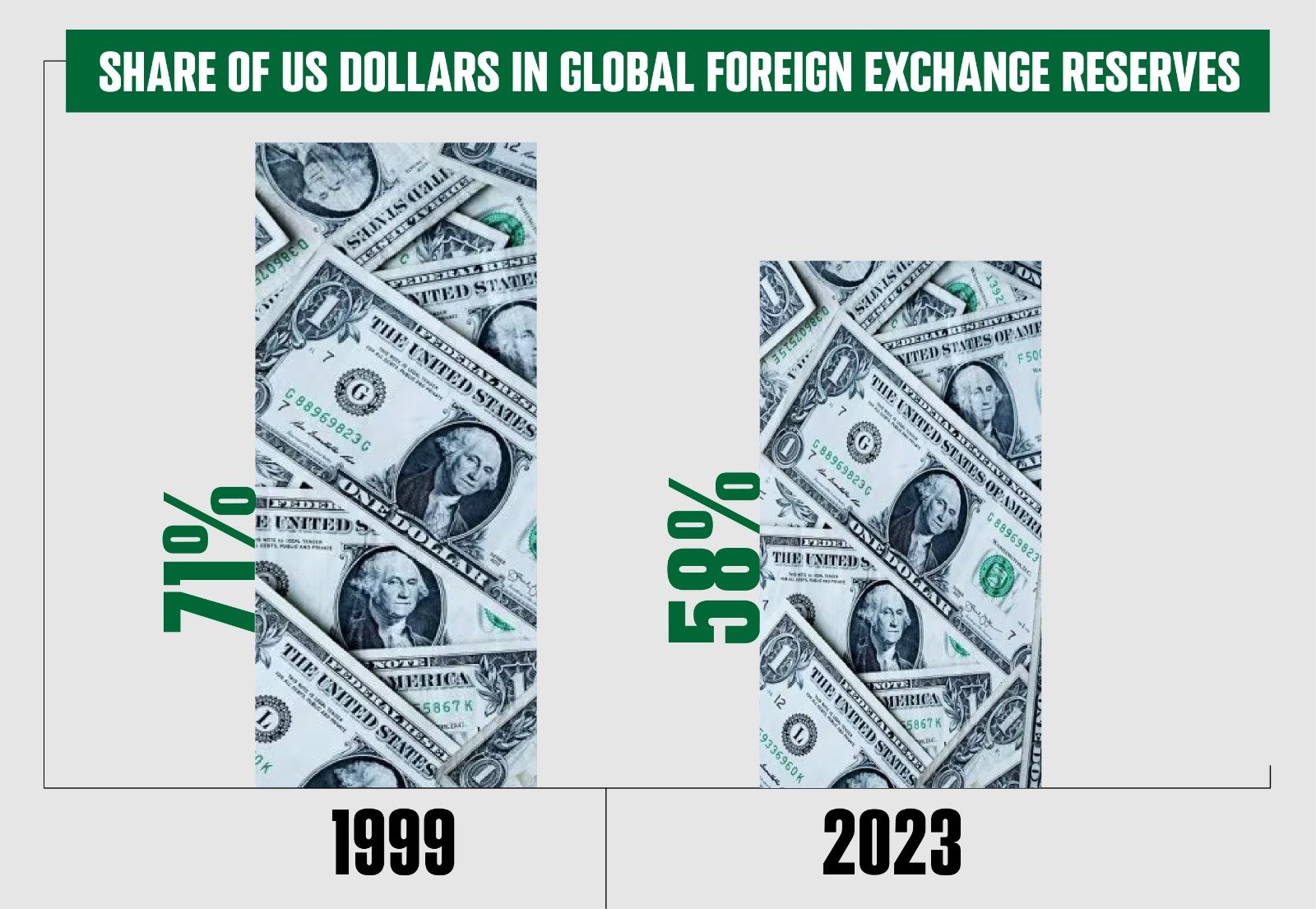According to the International Monetary Fund (IMF), the share of US dollars in global foreign exchange reserves has fallen from 71% in 1999 to 58% in 2023
For decades, the US dollar has been the cornerstone of the global financial system, not just as a currency of trade but as the world’s dominant reserve currency. It is estimated that the US dollar accounts for around 60% of global foreign exchange reserves, a share that has remained relatively stable for the past 20 years.
However, a rising tide of discontent and strategic maneuvering among several countries has begun to erode the dollar’s supremacy. De-dollarization—the process of reducing reliance on the US dollar in international trade, foreign reserves, and financial transactions—has gathered significant momentum in recent years. This shift is more than just an economic strategy; it represents a growing desire for economic independence and a challenge to the geopolitical power that the dollar enables.
The Push Toward De-Dollarization
De-dollarization is gaining momentum across regions, with several countries seeking to diversify their currency reserves and reduce dependence on the USD. According to the International Monetary Fund (IMF), the share of US dollars in global foreign exchange reserves has fallen from 71% in 1999 to 58% in 2023 (Figure 01). A key driver of this shift is the rise of China, whose yuan (CNY) has emerged as a viable alternative in trade deals. In 2023, China’s share of global foreign exchange reserves increased to 2.8%, up from 2.3% in 2019 (Figure 02), as more countries turned to the yuan for bilateral trade. For example, Brazil and Argentina have increasingly traded in yuan, with Brazil’s central bank allowing yuan-denominated transactions in 2023.

Figure 01
The BRICS bloc—comprising Brazil, Russia, India, China, and South Africa—has been at the forefront of this effort. China and Russia, in particular, have led the push for greater use of their currencies in international trade. In 2023, Russia and China signed a deal to settle trade in rubles and yuan, bypassing the dollar. Russia’s central bank also reported a significant rise in the yuan’s share of its foreign reserves, jumping from 0.3% in 2019 to nearly 13% in 2024.

In addition to BRICS, the Association of Southeast Asian Nations (ASEAN) is exploring alternatives to the US dollar. ASEAN’s new QR code payment system, introduced in 2023, allows countries to make payments using local currencies, reducing transaction costs by 30%. This system not only streamlines payments but also strengthens regional trade relationships and offers a buffer against the potential impact of US sanctions.

The Geopolitical Drivers of De-Dollarization
While economic factors certainly play a role, the geopolitical motivations behind de-dollarization cannot be overstated. Nations like Russia and China see the US dollar as a tool of American geopolitical dominance. The US’s ability to impose sanctions on countries like Iran, North Korea, and Venezuela has made many nations wary of their heavy reliance on the dollar. For these countries, reducing their dependence on the dollar is not just a matter of economic strategy—it is a way to regain autonomy in an increasingly multipolar world.
Saudi Arabia’s recent pivot is a case in point. The Kingdom, historically a close ally of the US and a major player in the global oil market, has been exploring options to sell oil in currencies other than the dollar. While the US remains Saudi Arabia’s largest trading partner, Riyadh’s growing ties with China and Russia are pushing it to consider diversifying away from the dollar. In fact, China and Saudi Arabia are already in discussions to use the yuan in oil transactions, a move that could deal a significant blow to the petrodollar system that has underpinned the dollar’s global dominance for decades.
Turkey, Iran, and other Middle Eastern countries have also taken steps to reduce their reliance on the dollar, often citing the destabilizing effects of US sanctions. For example, Iran has been exploring the use of the Iranian rial in bilateral trade agreements with neighboring countries, while Turkey has signed deals with several countries to settle trade in local currencies.
The Challenges of De-Dollarization
Despite the clear momentum toward de-dollarization, the road ahead is fraught with challenges. One of the key difficulties is the risk of new currencies failing to match the dollar’s stability and liquidity. The US dollar benefits from deep and liquid capital markets, strong legal systems, and a predictable financial environment—attributes that many countries’ currencies simply do not possess.
According to Joyce Chang, Chair of Global Research at JPMorgan, “The dollar’s role in global finance is supported by deep and liquid capital markets, rule of law, and predictable legal systems, all of which are necessary for the smooth functioning of the financial system.”
Additionally, shifting away from the dollar would require significant changes to the global financial infrastructure. The dominance of the dollar in global trade and finance has led to the creation of vast networks of dollar-denominated assets, from US Treasury bonds to the dollar-centric banking system. Replacing the dollar would require the development of alternative financial systems and institutions that could handle large-scale transactions with the same efficiency and reliability as the dollar-based system.
Another concern is the potential for currency instability. Countries like Brazil and Argentina, which have faced frequent currency crises, are well aware of the risks of volatility that come with relying on domestic or regional currencies. In 2023, for example, the Argentine peso lost over 50% of its value against the dollar, underscoring the fragility of some of the alternatives being promoted as part of de-dollarization efforts.
What’s Next?
While it is unlikely that the US dollar will lose its position as the world’s primary reserve currency in the short term, the ongoing de-dollarization movement is a sign of shifting global dynamics. Over the past decade, countries like Russia, China, and Brazil have already begun to reduce their dollar holdings, while many others have expressed a growing interest in pursuing similar strategies.
The key to successful de-dollarization lies not just in finding viable alternatives but in creating a global economic system that is more inclusive and less reliant on a single currency. The future of global finance may be multipolar, with a more diverse range of currencies, including the euro, the yuan, and regional alternatives, playing a more prominent role in international trade. Whether or not this will lead to the end of the dollar’s reign remains to be seen, but the winds of change are unmistakably blowing.


